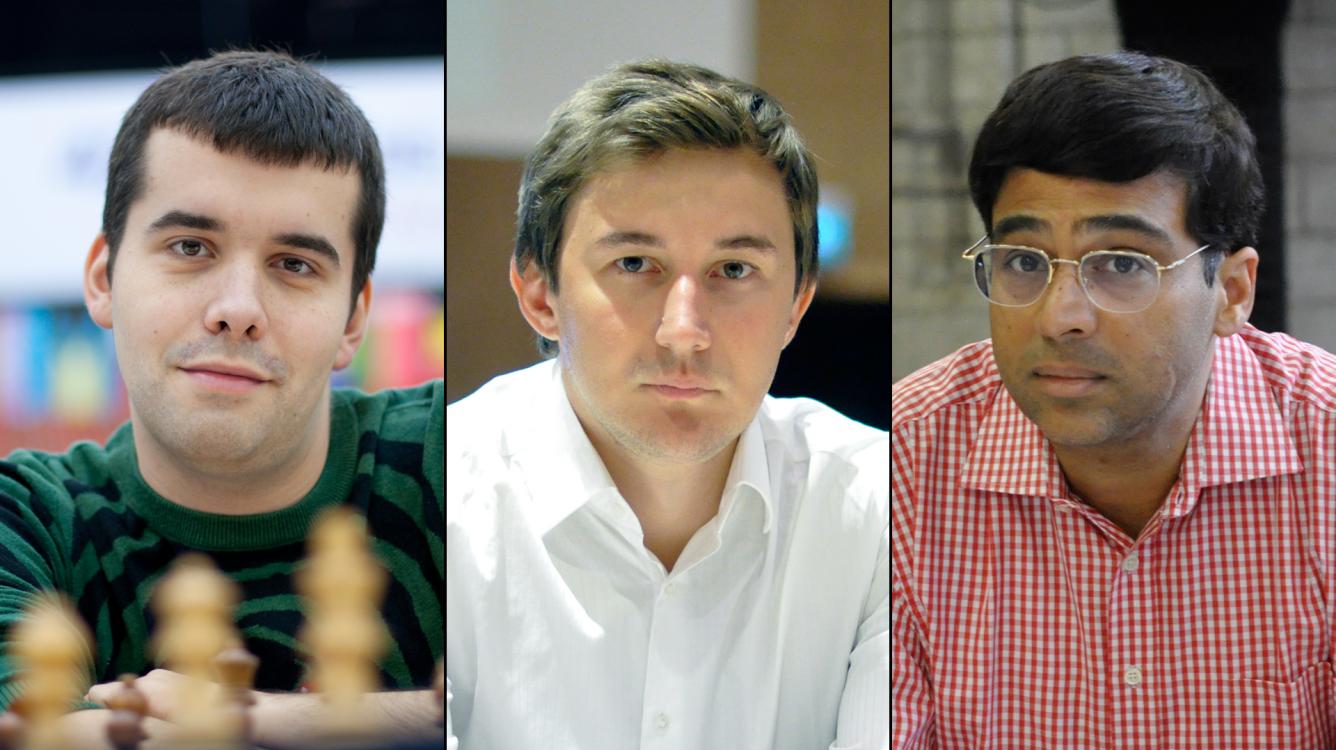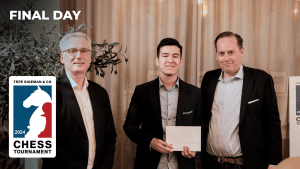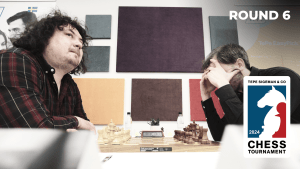
Grand Chess Tour Announces Rating System, Wildcards
The Grand Chess Tour (GCT) revealed two pieces of anticipated news today: the launch of its universal rating system (URS) together with announcing the wildcard players for the 2017 Grand Chess Tour.
The trio joining the tour will be newcomers GM Ian Nepomniachtchi and GM Sergey Karjakin alongside returning GM Viswanathan Anand.

In a press release that covers two separate topics, the organizers of the Grand Chess Tour have come with some big news today. Their own rating system has been launched, together with its January list (see below), and more details have been given about the 2017 participants. Let's start with that.
2017 Grand Chess Tour participants
The three wildcards for the 2017 tour are GMs Ian Nepomniachtchi, Sergey Karjakin, and Viswanathan Anand. According to the GCT organizers, Nepomniachtchi has earned his place "due to his consistency across all time formats which sees him placed 5th on the URS™ rating list as at 1 January 2017. This earned him selection as the highest ranked player on the URS™ not already picked."
Karjakin was the next on the list based on these criteria. While not a part of the official selection criteria, organizers noted his strong effort in the world chess championship and his recent win in the world blitz championship.
For Anand, the GCT organizers stated that the he is "ranked 10th on the URS™ rating list as at 1 January 2017" and that he "also tied for 4th place in the 2016 GCT tour despite only competing in three of the four events in 2016."

Together with these three wildcards, the 2017 tour will have six automatic qualifiers who secured their spots based on their 2016 GCT results or through their average FIDE classical ratings over the course of the 2016 calendar year:
GM Wesley So (USA) – Winner, 2016 GCT
GM Hikaru Nakamura (USA) – Runner-Up, 2016 GCT
GM Fabiano Caruana (USA) – 3rd place, 2016 GCT
GM Magnus Carlsen (NOR) – 1st slot, 2016 Average Rating
GM Vladimir Kramnik (RUS) – 2nd slot, 2016 Average Rating
GM Maxime Vachier-Lagrave (FRA) – 3rd slot, 2016 Average Rating
The first alternate, in case a player declines participation, is GM Levon Aronian. There are no fewer than 14 event wildcards in the 2017 Grand Chess Tour, with four in each Blitz & Rapid (Leuven, Paris and the new rapid event in St. Louis) and one each in the Sinquefield Cup and the London Chess Classic. The names of these wildcards will be announced later.
Universal Rating System
With its own website at universalrating.com, the GCT has now published the January 2017 list of what is called the universal rating system. The main idea of this system is that it combines results from classical, rapid and blitz chess to create one rating. At the moment, the top 10 looks like this.

The URS was developed as the result of a collaborative research project funded by the Grand Chess Tour, the Kasparov Chess Foundation and the Chess Club and Scholastic Center of Saint Louis.
The team consists of Maxime Rischard, Dr. J. Isaac Miller, Dr. Mark Glickman and Jeff Sonas. The latter is a familiar name in the chess world who hasn't been in the chess arena much lately, but last decade his Chessmetrics site attempted a ratings system that sought to determine the best player in history regardless of period active.
His dense explanation on the methodology for URS is somewhat beyond the scope of this news article, but here's some highlights in layman's terms:
- Like Chessmetrics, older games will "decay" and receive less and less value over time (this is similar to Ken Thompson's PCA ratings in the 1990s). Much like a tennis player's ATP Tour points expire after one year, a player's older games will gradually reduce in importance for URS calculation, finally falling off completely after six years.
- Elo ratings will not be used in any way for the calculation of URS. Instead a highly complex, "simultaneous performance rating" will be the main tool, whereby all games played by a player are judged at once.
- URS will take into account color, date played, and the time control.
- Different time controls seem to be weighed differently but the exact explanation or algorithm is not available on the website.
- Online games will not be factored in, but all over-the-board time controls will, providing the lower limit is at least G/5 (or 3+2).
"We expect some people to challenge the notion that games played at slow time controls can be mixed together with faster games within a single rating system," Sonas wrote.

Jeff Sonas holds a B.S. in mathematical and computational sciences from Stanford. He now owns Sonas Consulting. (Picture: Sonasconsulting.com)
He added that a purely random ratings system would only predict the winner of a decisive game 50 percent of the time, while a perfectly accurate system would predict the winner of a decisive game 100 percent of the time. His goal for URS is "75-80 percent," which is better than current prediction systems according to him.
Lovers of stats rejoice: Sonas has some very technical explanations waiting for you at universalrating.com.
For a real-world test of this, he analyzed the recent world blitz championship and showed how URS ratings would have been a better predictor of the outcomes of the games, despite the fact that they were blitz games paired via blitz ratings.
"On a consistent basis, from year-to-year, and across all three rating categories, the URS™ rating engine consistently predicted the results better," Sonas wrote. "Our findings indicate that that URS™ Ratings are better at identifying who is going to win a classical chess game than the FIDE Standard ratings."
[Edit January 4, 2017: GCT Spokesperson Michael Khodarkovsky confirmed that GCT events will be both FIDE rated and URS™ rated.]
The GCT's initiative is on the heels of Chess.com's announcement in October, 2016 of the CAPS System, which measures the accuracy of player's moves to arrive at a wholly different calculation of playing strength.



